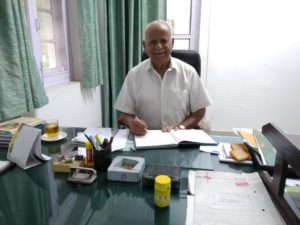KOOMTAI, Assam –

Forty years ago executives of Goodricke Group, which had just split from Duncan Brothers & Company Ltd., sent one of their best estate managers to Koomtai Tea Estate, a company-owned garden in Assam’s Golaghat district. His mission was to assess whether to sell off the unproductive property or revive it.
The manager, who was among the first batch of Indian tea executives to have been recruited by the British tea companies in India, had made a name for himself serving at the Gandhapara Tea Estate in the Dooars region of West Bengal. But three years after he arrived in Koomtai, despite his concerted efforts, huge losses continued. Goodricke decided to divest.
The garden was subsequently sold to an Indian owner.
The twist in the tale is that the new owners offered to keep Goodricke’s man to manage the garden. He was authorized to do whatever was required for its revival.
“After consulting with my Goodricke bosses who offered me full retirement benefits. I decided to stay at Koomtai,” recalled Sagar Mehta.
“My new bosses gave me a free hand and today the garden produces 2 million kilograms of made tea—more than double what the output during its early days. Thanks to the support I got from the workers, they have become my family,” said Mehta, the grand old man of Indian tea. Mehta was supposed to retire from Goodricke in 5 to 6 years.

Mehta, who turned 90 on May 5, is now the oldest serving tea garden executive in India. He says he is in no mood to hang up his boots. “I spent almost my entire life in tea and have miles to go,” says Mehta.
Koomtai Tea Estate, owned by the Badulipar Tea Company, has six divisions: Hinderting, Goriajan, Badulipar, Bonn, and Batlikhooa, with a total of 2,500 acres (1,126 hectares) under tea. It is considered one of the prime tea gardens in Assam, producing quality tea year after year. The garden, which is the largest in the district, employs an executive team of 10 with 247 on staff. They supervise 2,378 permanent workers and 1,200 casual workers.
Mehta is now president of the company, yet he stays in the manager’s bungalow on the tea estate. He visits the garden regularly. “I make it a point to visit the garden and the factory every day, apart from Sundays, despite the fact that I have eight officers to assist me. I know each and every tea bush in the garden,” he said.
Mehta’s day starts at 4 a.m. After an hour or so of meditation, a shower and a few morning chores at home, he is off to his office, arriving at 7 a.m. sharp. “This has been my routine since the day I landed in this garden in 1978,” he said.
Mehta’s 65-year tryst with tea started in 1954 when he joined the Gandhapara tea estate in the Dooars region.
“Soon after a year-long course in labor management in Calcutta, at the All India Institute of Personnel Management, I joined as an executive at Duncan Brothers & Company Ltd. and was among the first batch of Indian officers recruited by the British in tea then,” he said.
In 1965, during his tenure as manager, Kilcotta Tea Estate in Dooars was awarded the Tea Board of India’s top recognition for tea grown in the Dooars.
Many in the tea industry view Mehta as a father figure due to his vast experience.
“Mr. Mehta is an institution by himself having served the industry for such a long period and still going strong,” said Abid Rahman, CEO of Tea Valley, a newly launched tea brand in India. “Though I never got an opportunity to work with him, I did work at an estate where he served decades ago. He is remembered and respected to this day. Very, very few individuals would have worked so many years and contribute so much in their lifetime.
Rahman was a former senior manager of Goodricke Group who served the company for more than two decades before taking up the Tea Valley venture last year.

Tea Board India chairman Prabhat Kamal Bezbaruah has known Mehta since he joined his father’s tea business about four decades back. They remain in touch.

“Apart from his knowledge in tea, Sagar enjoys golfing,” Bezbaruah recalls. “He still plays 18-hole rounds and another 9 holes fairly regularly. I have been fortunate to play many such rounds with him starting when he was a septuagenarian and extending to when he became an octogenarian. A true sport, who played the great game like a gentleman, this spirit permeated all aspects of his life,” he said.
Be it good times or bad, Mehta has seen it all in the Indian tea industry.
“Labor management and climate change have become major challenges in the industry today,” observed Mehta. He recalled that in earlier days there was no opposition from workers, making labor issues much easier to handle. “Now the workers have to be consulted before taking any major decisions in the garden,” he said.
Uneven distribution of rainfall is another challenge faced by tea gardens. “It has been raining continuously for nearly 10 days now, it was not like this in earlier years,” he said.
Driving his white colored Gypsy through a narrow track amidst the lush green tea bushes at Koomtai, Mehta stops suddenly. He alights from his vehicle and walks to a distinct patch of tea bushes, closely observing their color and vigor.
“This patch is infected with pests, do the needful,” Mehta instructs an assistant, who has been monitoring tea pluckers nearby. It’s the second flush at Koomtai and Mehta remains in the prime of life.
I enjoyed reading this article on Sagar Mehta, potraying a true snapshot of his long-term leadership in tea cultivation, tea science and management. During my days at Tocklai Tea Research Institute as an Advisory officer, I had several visits to Koomtai TE during 1995-2002. He served as the Chairman of TRA’s Area Scientific Committee for the South Bank for a long time. Serving as the Secretary of the Committee, I found him always a great supporter of tea research and development. Long live Sagar; hope our paths will cross again.
Thanks to Pullock Dutta for a nice article.
I was born in Jorhat in 1974. At the time my father was working on Koomtai tea estate and my grandfather (Marshall family) was a manager of the Shamaguri I believe. I was always intending to come back to Assam with my father and two sons. But unfortunately my father has passed away and I am looking for information on the various tea planters clubs and other sporting clubs as my father was an avid cricket and golf player. Hopefully I can also find other records and photos
I was born in Shyamguri TE where my father (Lt. David William Farnham was the Manager (1969-1984). I heard a lot of old stories from my father about old Harold Marshall who was also managing Shyamguri TE in early 60s just before my father joined in. I would love to get in touch. Email: geoffreyfarnham1568@gmail.com. Phone 9957155332.
An absolute inspiration to the younger generation of Tea planters. My journey in the Plantation started with Duncan’s and various other companies including Mcleod Russell, ended again back with Duncan’s. Sagar Mehtas name is legend in Killcott and may he carry on not just working but by rubbing off that old world dedication to all other younger planters who come in contact with him. A person to be emulated.
Great. First time I tested Tea Valley tea only in this month and found extremely good quality tea available in its price. Now I realised by reading the article that this could only be possible for Mr Meheta only. This great person is really a wizard. I found from my experience the Tea Valley tea-Original is the best, the royal is manageable but classic – I think is suitable for road side tea stalls hence, it’s packaging should be made cheaper which will make the tea cheaper and it’s price will suit the tea stall owners. For tea stalls a tea stall pack may be introduced in 1kg or more with a less price. There is a huge market for classic type tea in india used by the tea stalls. The Tea Valley tea must be available in open market. I found it only in online shopping. It must be available at malls and super markets. If Mr thinks it is any worth he may look into the matter.
I have had the honour to work under Sagar in 1979/80 at Leesh River Tea garden . He used to be looking after two garden those days. Aibheel and Leesh River. Fromthere he went to Kumtai. Hewas thorough in his work and gave attention to smallest of details. A great planter and sportsman. Weplayed a lot of badminton in his bunglow. After that he would swim in the bunglow pool and we would drink with him and enjoy his hospitality till midnight. Wewould encounter him early morning at 6am on the horse back having a round of the garden. Hewould invariably play a round of golf in the club on wednesday afternoon. Saluteto him.